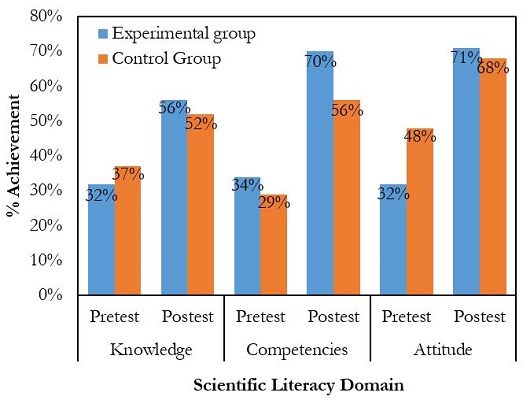
The Effect of Project in Problem-Based Learning on Students’ Scientific and Information Literacy in Learning Human Excretory System
Abstract
The present study aims to investigate the effect of Project in Problem-Based Learning on students’ scientific and information literacy in grade 8 studying in one of the private schools in Bandung in the human excretory system topic. A sample of 39 students in two classes was selected purposively from the five classes available in the school. An experimental group comprising 19 students received the instruction by Problem-Based Learning with the project at the end of the lesson while the control group comprising 20 students received the human excretory instruction by using Problem-Based Learning without a project. The data was collected via the pre-test and post-test administration. The results were statistically analyzed using SPSS software by employing an independent t-test. Results indicated that after the one-month treatment period, students in the experimental group have a higher score in the scientific literacy test compared to the students in the control group even it was not significantly different. Therefore, the results of students’ information literacy showed that there was a significant difference between the experiment and control group. It is concluded that Project in problem-based learning is useful to conduct as the learning strategies in the classroom to improve students’ scientific and information literacy.
Full Text:
Download PDFReferences
Akinoglu, O., & Tandogan, R. O. (2007). The Effects of Problem-Based Active Learning in Science Education on Students' Academic Achievement, Attitude and Concept Learning. Eurasia Journal of Mathematics, Science & Technology Education, 71-81.
Ajai, J. T., Imoko, B. I., & O'kwu, E. I. (2013). Comparison of the Learning Effectiveness of Problem-Based Learning (PBL) and Conventional Method of Teaching Algebra. Journal of Education and Practice, 4(1), 131-135.
Ardianto, D., & Rubini, B. (2016). Comparison of Students' Scientific Literacy in Integrated Science Learning through Model of Guided Discovery and Problem Based Learning. Jurnal Pendidikan IPA Indonesia, 5(1), 31-37.
Association of College and Research Libraries. (2000). The Information Literacy Competency Standards for Higher Education. Chicago, Illinois: American Library Association.
Baden, S., Manggi, Major, H., & Claire. (2004). Foundations of Problem Based Learning. Birkshire, England: The Society for Research into Higher Education & Open University Press.
Cardellini. (2012). Chemistry: Why the Subject is Difficult? Educational Journal, 1 - 6.
Cimer, A. (2012, January 19). What Makes Biology Learning Difficult and Effective: Students' Views. Educational Research and Reviews, 7(3), 61-71.
Clayton, G., & Pierpoint, P. (2004). Problem Based Learning: A Would-be Practitioner's Guide. Coventry: A National Teaching Fellowship Project.
Creswell, J. W. (2012). Educational Research: Planning, Conducting, and Evaluating Quantitative and Qualitative Research (4th ed.). Boston: Pearson.
Diekema, A. R., Holliday, W., & Leary, H. (2011). Re-framing Information Literacy: Problem-Based Learning as Informed Learning. Library & Information Science Research, 33, 261-268.
Fives, H., Huebner, W., Birnbaum, A. S., & Nicolich, M. (2014). Developing a Measure of Scientific for Middle School Students. Science Education, 549-581.
Fraenkel, J., Wallen, N., & Hyun, H. (2012). How to Design and Evaluate Research in Education (8th ed.). New York: Mc Graw Hill.
Hake, R. R. (1999). Analyzing Change/Gain Scores. Woodland Hills: American Educational Research Association's Division.
Inel, D., & Balim, G. (2010). The effects of using problem-based learning in science and technology teaching upon students' academic achievement and levels of structuring concepts. Asia-Pacific Forum on Science Learning and Teaching, 11(2), 1-23.
Kurnia, F., & Fathurohman, A. (2014). Analisis Bahan Ajar Fisika SMA Kelas XI di Kecamatan Indralaya Utara Berdasarkan Kategori Literasi Sains. Jurnal Inovvasi dan Pembelajaran Fisika, 1(1), 43-47.
Latip, A., & Permanasari, A. (2015). Pengembangan Multimedia Pembelajaran Berbasis Literasi Sains untuk Siswa SMP pada Tema Teknologi. Edusains, 7(2), 160-171.
Montana Office of Public Instruction. (2010). Information Literacy/Library Media Content Standards Framework. Helena: Accreditation Division, Curriculum and Instruction Unit.
OECD. (2016). Programme for International Student Assessment (PISA) Results from PISA 2015. OECD. Retrieved May 24, 2018, from https://www.oecd.org/pisa/PISA-2015-Indonesia.pdf
Ornek, F., Robinson, W. R., & Haugan, M. P. (2008). What Makes Physics Difficult? International Journal of Environmental & Science Education, 3(1), 30-34.
Shultz, G. V., & Li, Y. (2016). Student Development of Information Literacy Skills during Problem-Based Organic Chemistry Laboratory Experiments. Journal of Chemical Education, 93, 413-422.
Wenger, K. (2014). Problem-Based Learning and Information Literacy. Research & Practice, 2(2), 142-154.
DOI: https://doi.org/10.17509/jsl.v2i2.12840
Refbacks
- There are currently no refbacks.
Copyright (c) 2019 Author
License URL: https://creativecommons.org/licenses/by-sa/4.0/


Jl. Dr. Setiabudhi 229 Bandung 40154, West Java, Indonesia











